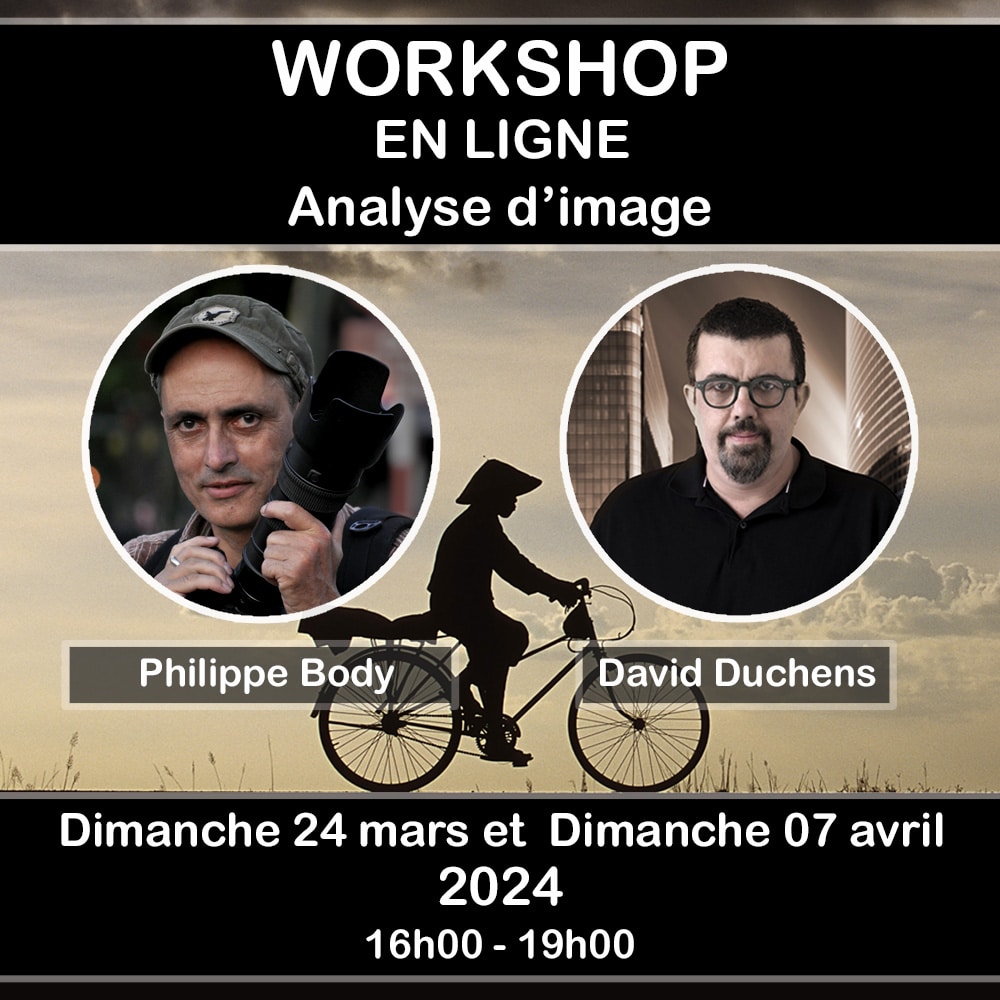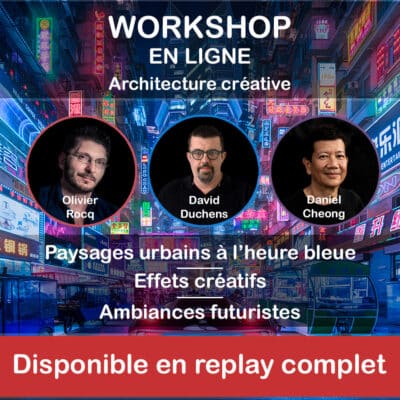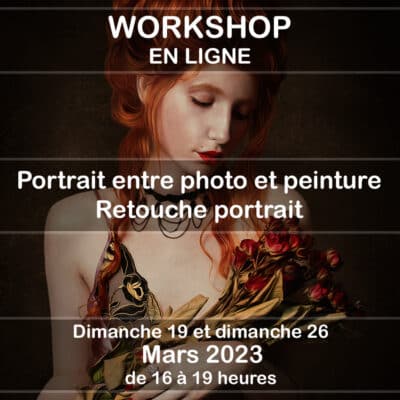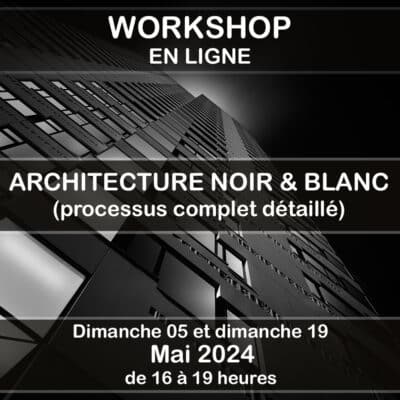description
Preamble :
I'm delighted to be able to offer you this original workshop, very different from my other workshops based essentially on image creation, thanks to this very first collaboration with Philippe Body.
Here, we'll be looking at the fundamentals of photography. It starts with composition and image analysis.
The technical side of Photoshop or Lightroom will be dealt with only very lightly, to teach you how to use cropping tools, or even simple correction tools.
This workshop is therefore open to everyone, as no prior technical knowledge is required. In fact, a photo may already have all the features you need when you take it.
At this workshop, no fewer than 50 photos will be analyzed, and they'll all be yours.
Please see below for details.
Biography of Philippe BODY - Travel Photographer :
Born in 1962 in Niort.
Travel was his first passion. A childhood dream, already nourished by the images of Roland and Sabrina Michaud or Éric Valli, which led him almost naturally to photography. Self-taught, he learned photography by looking at their pictures. Fascinated by the color work of Ernst Hass, as well as by the powerful testimonies of American social photography, he tried to reconcile documentary approach and aesthetics in his photographs.
In the early 80s, after several trips to Africa, he discovered India, then Southeast Asia. It was love at first sight. For over thirty years, through commissioned reports for magazines and his personal work, he has striven to combine these two passions. From Cambodia to Burma, via Vietnam and India, he seeks to capture the soul of a small number of peoples and territories. He often returns to the same places, delving into the same subjects to strip away all exoticism and get to the heart of the matter, showing another culture, another point of view on the world, in all its dignity and complexity.
For him, photography is not only one of the most beautiful professions in the world, it's a way of life as well as a quest, a way of opening up to others and surpassing oneself. The art of capturing a little of the magic of the world that never ceases to amaze him.
In the late 80s, he and his wife Nathalie produced a report on the inaccessible Muria ethnic group in India's remote Chattisgarh province, and another on the gigantic Narmada dam project in the same country. Several publications followed, and his early work was distributed by the VU agency, then headed by Christian Caujolle. Five years later, he joined the Hoa Qui agency, specialized in travel photography, then Gamma-Rapho, before joining the prestigious Hemis.fr agency in 2007. In 2010, he created the "avecunphotographe.fr" website to offer training in composition.
His reports have been published in French and international magazines (Géo, Grands Reportage, Animan, Terre Sauvage, Figaro Magazine, EDJ, Gente Viaggi, Descobrir, etc.). Author of several books on Vietnam (Ed. Le Chêne, Tschent, Palantines) and travel guides (Normandie, Alsace), he also works with several tour operators.
Workshop content:
Philippe Body (Sunday, March 24, 2024):
IMAGE ANALYSIS
Learn to read your photos to write them better.
The key to a good photo almost always lies in its composition. But composition is more than a purely instinctive act or a collection of tips and tricks: it's a language with its own rules for reading and writing.
When you make a technical, focusing or exposure error, your image appears blurred, too dark or too light. The problem is easy to see, and therefore easy to fix. On the other hand, if the shots overlap and disturb the reading direction, it's more difficult to identify and therefore to correct. Image analysis will help you understand what's going wrong.
Workshop content
You'll learn to read your photos, recognize the subject, identify the image pattern and establish a hierarchy of the visual elements that make it up. This will enable you to see whether the picture is working, and whether certain elements are disturbing or enriching it.
This will open the door to inspired cropping that will highlight the strong points of your image, and remove any excessively wide spaces, highlights or other negative elements that get in the way.
In detail
In the first part of the workshop, we "ll take a quick look at the reading direction of an image - as recorded as early as the late 1960s by a Russian scientist. And you may be surprised by his conclusions. We "ll talk about human perception as explained by Gestalt theory. You'll learn about the hierarchy of visual elements that attract our attention in an image, and what can disrupt it. And it's on these scientific discoveries that I've based my analysis technique.
After this quick introduction, we'll move on to image analysis techniques and comment on your photos.
- Subject identification,
- who's the boss?
- hierarchy of visual elements and kingmakers,
- who plays with or against the team,
- reading direction,
- strengths - what works,
- what doesn't work or works less well,
- strong content / weak content
- linking the various compositional elements
Precision
Submitting your images to analysis is a difficult, even painful exercise for the ego, and one that you can be legitimately apprehensive about. The golden rule is benevolence. There's no pain in learning. There's no judging, grading or comparing. The idea is to get professional feedback on your work, from someone whose specialty it is. Everyone needs feedback on their work if they are to progress.
The aim is not to judge, but to analyze and understand any compositional errors you may have made, so as to avoid repeating them and progress, while retaining your own style. During my training sessions, I never say: "If I were in your shoes, I would have done it this way or that way". For one thing, I wasn't in your shoes, and for another, we don't have the same sensibility or the same outlook. The important thing is that your image works and that you like it.
Reading well for better writing
In the field, things often move too fast, and you can't think of everything. In-depth analysis of your images allows you to understand - in hindsight - what went right and what went wrong, and therefore what should have been done. This process of reflection prolongs the shooting process and enables us to make corrections next time. As situations always repeat themselves, you'll make rapid progress.
Educating the eye
The eye learns, just like a chef's palate or a musician's ear. And that's the aim of this workshop: to share my experience with you, to develop your eye, to make you a better photographer.
David Duchens (April 07, 2024):
During this session, I'll go back over the images analyzed by Philippe during his presentation, and make any necessary corrections and improvements in post-processing. To do this, I'll base myself on Philippe's analysis of each photo.
The idea here is to show you some very simple tools to use, and some very simple techniques to apply. Many of these tools are available in Lightroom.
Tools covered in Photoshop:
Crop, composition aid, guides, image straightening, correction/removal of small unwanted elements, colorimetric adjustments, brightness, etc.
Please note:
Depending on the first session presented by Philippe, we will adapt the timing if image analysis is to be continued in the second session. This will depend above all on the number of participants.
How to participate in the workshop:
Once you have registered, you will receive precise instructions on how to submit your photographs around 2/3 weeks before the start of the workshop.
The principle is simple.
You can send 5 photos, 2 of which will be selected for the image analysis presented by Philippe Body during his session.
The number may be adjusted according to the final number of participants.
As the number of participants is limited to 25, a maximum of 50 photos will be analyzed during the workshop. This will allow sufficient time to comment on each photo.
The number of photos analyzed may be adjusted according to the final number of participants.
Questions / Answers :
During the different stages of the 2 workshops, questions may be asked.
Also, 30 minutes will be devoted at the end of the workshop for a question and answer session.
Workshop schedule:
This workshop will be held online (via the Internet), and live. The ZOOM videoconferencing application will be used. Connection is just a few clicks away. You don't need to create an account or subscribe to Zoom to take part in the workshop. An invitation link will be sent to you by e-mail before each session. You will then simply be asked to download the application, in order to get access to the user interface. It's very easy to learn. Don't hesitate to contact us if you have any questions.
Video summary:
This workshop is accompanied by a video for each session.
It is recorded live during the workshop.
The video will be sent to you in MP4 format, via WeTransfer, after each session.
Social networks :
You can discover Philippe Body's work on his website:
https://avecunphotographe.fr/
Facebook :
https://www.facebook.com/philippe.body.1





Claire Laur-Schneider (confirmed customer) –
I was lucky enough to attend the workshop on image analysis, with guest speaker Philippe Body. It was extremely dense, rich and instructive! Philippe Body's extensive knowledge of images, including two books on "the grammar of the image", is an added bonus that shows us how to look at a photo, how to read it and, above all, how to make it readable by composing it in such a way as to perfectly convey our intention. The analysis was based on the participants' own photos, and we were able to learn from each other. After a workshop like this, you know how to look at your photos differently to get the best out of them. It's a job that starts when you take the photos and continues when you sort and post-process them. I can't wait to sign up for the next one! Well done to both of you!
Thierry Ferrando (confirmed customer) –
Once again, David takes us off the beaten track with this workshop, offering a much-needed new approach to photography that is often overlooked. The pairing formed with Philippe Body is simply excellent, and the complementary nature of the pairing is spot on. You'll come away from this new Workshop with a wealth of new knowledge that you can quickly put into practice, and above all a new perspective that you'll be able to take either through the eyepiece or in post-processing. And what can I say about the atmosphere? There was a lot to talk about, and although it was remote, you'd have thought it was a face-to-face event..,
Serge Noel BRULE (confirmed customer) –
This course in image analysis by Philippe Body and David Duchens is absolutely sublime.
It enables us to understand the power of an analyzed, thought-through image.
It trains our eye as photographers, perhaps first in post-processing, but we soon realize that we can also do this in the field by following the basic rules set out by Philippe.
In addition to his lessons, David will teach you simple techniques for applying them.
Once you've trained your eye and your mind, you'll be able to improve your photos and convey your emotions to your viewers.
I hope there will be many more workshops with this wonderful team in the future, as the subject seems inexhaustible.
Many thanks to both of you.
Frédérique LIGER (confirmed customer) –
The image analysis carried out by Philippe Body leads to a genuine reorganization of the knowledge you may have already acquired, and complements it: you understand in depth why you should act in such and such a way on an image to give it its full meaning, and sometimes make it spectacular. This training helps you to get away from the unfounded injunctions that are commonplace in the world of photography (the inescapable rule of thirds, the prohibition on cutting off a toe, etc.). At the end of the course, you'll be able to make reasoned choices when it comes to photography. The retouching part of the course with David Duchens was of less interest to me, as I don't work with Photoshop, but his teaching skills mean that I feel perfectly capable of transposing his contribution to Affinity. Last but not least, all this work has been carried out in a very friendly atmosphere. In my opinion, this is essential if you want to raise the quality of your work.
Claude Attard (confirmed customer) –
Philippe Body and David Duchens put in a great performance on photo analysis. Absolutely fascinating new points of view were opened up to me. I'd never looked at a photo in this way, nor imagined that a simple cropping, carried out by a method as enlightened as this one, could change so much the perception one has of an image. As I've been using Photoshop for many years, it's this part of the workshop in particular that captivated me, which of course in no way detracts from the immense interest of the retouching part, which is designed to enhance the subject.
Michel Lacroix (confirmed customer) –
The workshop I attended took place on March 24 and April 7. Its theme was "image analysis".
In the first part, Philippe Body commented on and analyzed the participants' images. He brought his expertise in framing, looking at images and global and analytical reading. We discovered another way of looking at our images, with the aim of getting to know our photos, improving them and, if possible, getting into the emotional side of things.
In the second part, David Duchens introduced us to a Photoshop toolbox that allows us to go even further. David took the participants' images and brought his Photoshop expertise to bear. The tools he presented covered noise reduction, image straightening, filters and blurring. At the end of the presentation, Philippe completed the analyses and we exchanged ideas on image impressions.
This 2-part workshop is well-balanced, with traceability ensured by the video recording made available to participants.
Annick Quesnot –
A fascinating exchange between two different worlds.
Philippe explained how on-the-spot analysis and cropping allow us to dive deeper into the image.
David demystified Photoshop with simple and clear manipulations, while respecting and not distorting the author's idea. It's important to distinguish between analysis and criticism.
To be listened to again and again, without moderation.
Daniele Schlusmans (confirmed customer) –
I lost no time in Philippe Body's presentation.
If you thought you knew everything there was to know about criticism, or more exactly photo analysis, think again. Philippe Body is just fascinating to listen to and all the explanations he gives, what catches the eye in a photo, how to enhance the subject, why and how to do it and why it doesn't work...(I'm not going to give it all away :-)). You'll soon find out, and you'll never look at your photos in the same way again, nor those of others. You'll be asking yourself the right questions not only when you take the shot, but also afterwards in post-processing.
The post-processing session is led by David, and based on the photos you send in and Philippe's initial analysis, we'll suggest improvements to enhance or correct any problems you encounter.
This training is a real long-term investment and a guarantee of better photos with a real impact on readers.
Go for it....afterwards, as they say, there's nothing left to do....